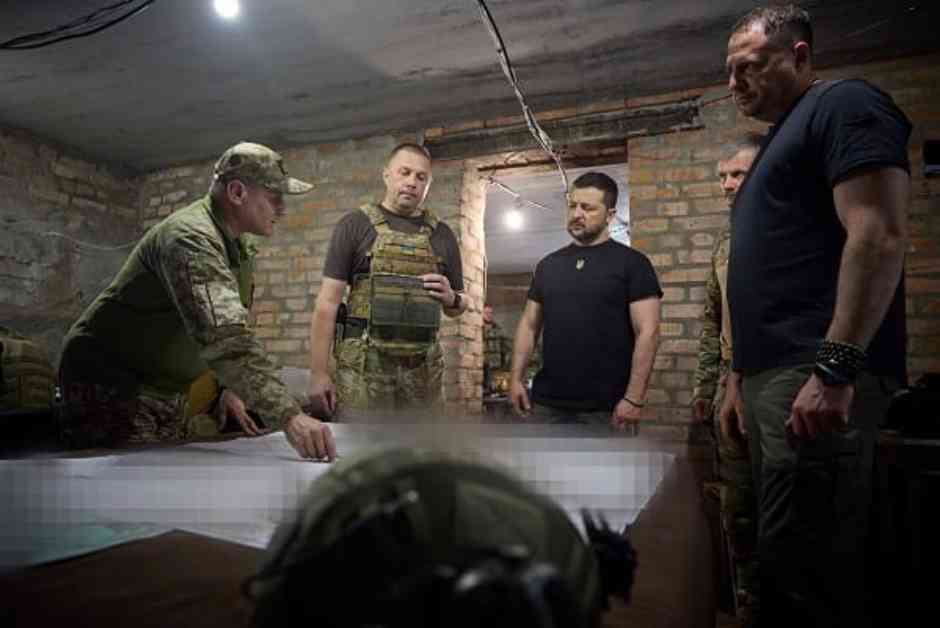Kyiv’s Silence on Kursk Incursion: Fear of Crossing Putin’s ‘Red Lines’
The Ukrainian President, Volodymyr Zelensky, made a shocking revelation recently, stating that the West was not informed of their preparations to invade the Kursk region in Russia. This decision was made out of fear of crossing Vladimir Putin’s “strictest of all red lines,” which could potentially lead to a nuclear attack. The ongoing incursion by Ukraine into the Kursk Oblast region has now entered its second week, with over 1,250 square kilometers of territory captured, including 92 villages.
Zelensky’s comments shed light on the delicate balance of power and fear that exists between Ukraine and Russia. The notion that any action taken by Ukraine could potentially trigger a nuclear response from Putin’s regime highlights the high stakes involved in the conflict. The fact that Ukraine proceeded with the invasion without alerting their Western allies speaks volumes about the level of caution and secrecy surrounding their operations.
The capture of significant territory in the Kursk Oblast region has undoubtedly escalated tensions between Ukraine and Russia. The Ukrainian President’s acknowledgment of the “red lines” set by the Kremlin underscores the need for careful navigation of the geopolitical landscape in Eastern Europe. The situation in Kursk has the potential to spiral out of control, with both sides heavily invested in their respective positions.
Russia’s Response and Military Build-Up
As Ukraine continues its incursion into the Kursk region, Russia has responded with preparations for a massive attack. Reports have emerged of nuclear bombers conducting “false launches,” a tactic that serves as a show of force and intimidation. The Russian military has also been accused of targeting civilian infrastructure in cities and towns across Kursk, leading to further destabilization in the region.
Belarus, a close ally of Russia, has stationed a significant reinforcement of troops and aviation along its border with Ukraine. This move signals the potential for a wider conflict involving multiple actors in the region. The militarization of the border areas indicates a heightened state of alert and readiness on both sides, with the potential for further escalation looming large.
The summoning of a US diplomat over allegations of journalists and private military contractors operating “illegally” in the Kursk region adds another layer of complexity to the situation. The involvement of foreign entities in the conflict further muddies the waters and raises concerns about the potential for internationalization of the conflict. The delicate diplomatic dance being played out behind the scenes reflects the high stakes involved for all parties concerned.
Implications for Global Security
The ongoing conflict in the Kursk region has far-reaching implications for global security. The specter of nuclear escalation looms large, with the potential for catastrophic consequences if the situation spirals out of control. The delicate balance of power between Ukraine and Russia, as well as the involvement of other actors in the region, underscores the need for a concerted international effort to defuse tensions and prevent further escalation.
The lack of transparency and communication between Ukraine and its Western allies regarding the incursion into Kursk raises questions about the efficacy of existing diplomatic channels. The need for a coordinated response to the crisis is more urgent than ever, with the potential for miscalculation and unintended consequences high on all sides. The international community must work together to find a peaceful resolution to the conflict and prevent a further deterioration of the situation.
The implications of the conflict in Kursk go beyond the immediate region, with ripple effects felt across the globe. The potential for a wider conflict involving multiple actors, including nuclear-armed powers, underscores the need for a swift and decisive diplomatic intervention. The stakes are high, and the consequences of inaction could be catastrophic.
In conclusion, the ongoing incursion by Ukraine into the Kursk region, and the subsequent escalation of tensions with Russia, highlights the fragile nature of the geopolitical landscape in Eastern Europe. The fear of crossing Putin’s “red lines” and the potential for a nuclear response underscore the high stakes involved in the conflict. The international community must work together to find a peaceful resolution to the crisis and prevent a further escalation of hostilities.

